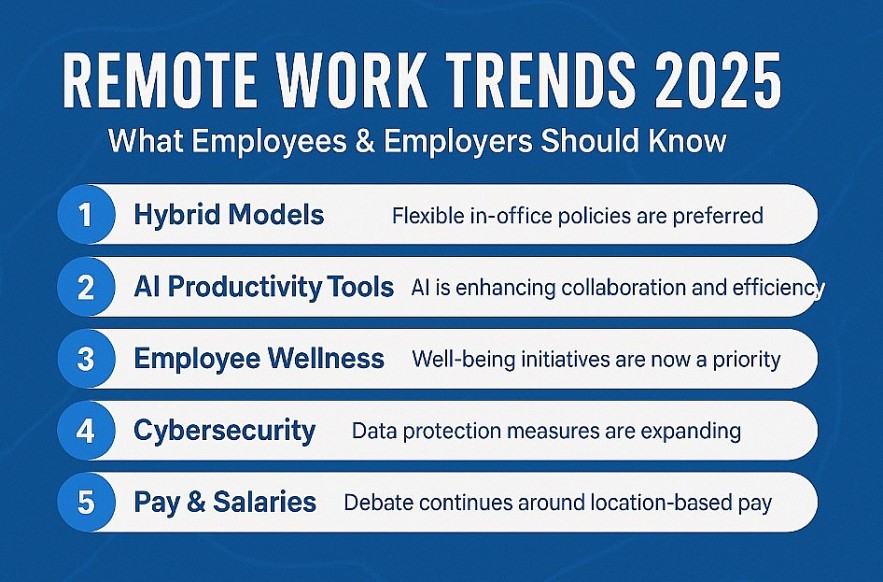Remote Work Trends 2025: What Employees & Employers Should Know This Monday
 Manus AI Startup: How China’s Next DeepSeek Is Redefining Autonomous AI Manus AI Startup: How China’s Next DeepSeek Is Redefining Autonomous AI |
 China’s Top 10 Most Promising AI Startups After DeepSeek China’s Top 10 Most Promising AI Startups After DeepSeek |
 |
| Remote Work Trends 2025 |
Across the United States, over 74% of white-collar employees now work remotely at least part-time, reshaping how, where, and why we work. Whether you are a freelancer in Austin, a product manager in Boston, or a startup founder in Denver, the way you approach Monday morning sets the tone for your entire week.
So what is trending now? What strategies are reshaping the future of work?
Here are the top 5 remote work trends in 2025 that every professional and employer should watch this week.
1. Hybrid Work Goes Hyper-Flexible
The rigid “3 days in, 2 days out” model is fading. Companies are now shifting toward “dynamic hybrid” schedules tailored to the needs of individuals and teams.
Key Highlights:
-
82% of surveyed employees prefer customized hybrid flexibility (McKinsey Workforce Index, 2025).
-
Companies like Salesforce and Airbnb now allow departments to set their own in-office cadence.
-
Performance is increasingly measured by outcomes, not physical presence.
Actionable Tip for Employers:
Stop focusing on attendance metrics. Instead, co-create hybrid work plans with your teams based on job function and collaboration needs.
2. AI Tools Are Now Remote Workers’ Digital Coworkers
Forget basic task managers—AI is now integrated into the remote workflow. In 2025, teams are leaning on intelligent systems for meetings, planning, communications, and even coding.
Popular AI-Powered Tools in 2025:
| Tool | Function |
|---|---|
| Slack GPT | Auto-summarizes threads, drafts messages |
| Otter.ai | Live meeting transcription & action item tracking |
| Notion AI | AI-driven knowledge base & document writing |
| Loom AI Assistant | Video transcriptions, chapters, and analytics |
| Trello AI | Smart task prioritization & suggestions |
What It Means:
AI helps reduce “Zoom fatigue” and manual busywork. But to benefit, companies must train employees to use these tools effectively.
3. Employee Wellness Is the Core of Retention
Burnout in 2023–24 taught remote organizations a hard lesson: working from home does not always mean work-life balance.
In 2025, employee wellness has become a core business strategy, not a soft perk.
Current Wellness Trends:
-
Mental health days built into PTO policies
-
Asynchronous Mondays or Fridays to reduce meeting overload
-
Subsidies for home office ergonomics, meditation apps, and therapy
-
Well-being KPIs integrated into team performance reviews
Why It Works:
Companies that prioritize mental health report 24% higher retention and 30% higher productivity (Harvard Business Review, 2025).
4. Cybersecurity in a Decentralized Workplace
With employees scattered across states—and even countries—cyber threats have grown in both volume and sophistication.
In 2025, cybersecurity is the foundation of remote trust.
What Companies Are Doing:
-
Mandatory Zero Trust Architecture (ZTA) policies
-
Company-managed VPNs and device monitoring
-
Bi-weekly phishing simulations
-
Endpoint Detection and Response (EDR) for remote endpoints
Tips for Teams:
Never work from public Wi-Fi without a VPN. Update software weekly. Encourage employees to treat cyber hygiene like physical hygiene.
5. The Pay Transparency and Location-Based Salary Debate
Should a remote worker in Kansas earn the same as one in New York?
In 2025, this question is still dividing HR teams—and impacting retention.
Snapshot:
-
Big Tech still adjusts salaries based on location.
-
Startups and remote-first firms lean toward flat-rate compensation for fairness and simplicity.
-
Job boards like Levels.fyi and RemoteOK now include location-adjusted salary calculators.
Employee Sentiment (Glassdoor Survey, 2025):
-
63% of remote employees believe equal pay for equal output is fair.
-
51% say non-transparent pay policies affect job loyalty.
Expert Insight: What Remote Workers Say
“Remote work in 2025 is all about choice and autonomy. The best companies give you the tools, flexibility, and clarity to do your best work—from anywhere.”
— Jasmine D., Head of Remote Operations, Atlanta
“AI doesn’t replace us—it accelerates us. But the real winners are teams that balance AI tools with human empathy.”
— Leonard T., Product Manager, San Diego
Bonus Table: Fastest Growing Remote Job Titles in 2025
| Job Title | Avg. Annual Salary | Remote Compatibility |
|---|---|---|
| AI Prompt Engineer | $128,000 | 95% |
| Virtual HR Manager | $92,000 | 88% |
| Remote Sales Consultant | $78,000 | 86% |
| UX Researcher | $102,000 | 79% |
| Online Course Designer | $85,000 | 91% |
FAQs: Remote Work in 2025
Q: Is remote work still increasing or plateauing?
A: It is stabilizing at a high level, with hybrid models becoming dominant. Most companies plan to keep remote options open indefinitely.
Q: Which industries are going fully remote?
A: Tech, media, digital marketing, customer service, and edtech continue to lead remote-first hiring.
Q: Are there tax implications for working remotely across states?
A: Yes. Multi-state remote employees may face dual tax filings. Consult HR or a tax advisor if you have worked from multiple states in one year.
Q: Can remote workers still get promoted?
A: Absolutely—if performance metrics are transparent. Many remote-first companies now publicize internal hiring and promotion pathways.
Final Thoughts: Your Remote Compass for the Week
The remote work landscape is not just about location—it is about culture, autonomy, and trust.
Start your week by asking:
-
Employers: Are we empowering flexibility and accountability?
-
Employees: Am I maximizing the tools, time, and trust I have been given?
In 2025, remote success is not about staying online. It is about staying aligned—with your team, your tools, and your values.
 Unveiling DeepSeek China: Distilling U.S. Technology with Only 17% Accuracy? Unveiling DeepSeek China: Distilling U.S. Technology with Only 17% Accuracy? OpenAI says it has evidence that Chinese company DeepSeek used its proprietary models to train cheap chatbots. |
 Top 10 Best Countries for Startups in 2025, Ranked by Startup Blink Top 10 Best Countries for Startups in 2025, Ranked by Startup Blink We will explore the top 10 best countries for startups globally, ranked by StartupBlink based on key indicators such as startup quantity, quality, and business ... |
 AI News Roundup: China's Universities Expand AI, AI to Reduce Subway Delays AI News Roundup: China's Universities Expand AI, AI to Reduce Subway Delays Artificial Intelligence (AI) continues to be a driving force in technological innovation, influencing various sectors globally. Recent developments have highlighted significant advancements, policy shifts, and ... |
 Manus AI Startup: How China’s Next DeepSeek Is Redefining Autonomous AI Manus AI Startup: How China’s Next DeepSeek Is Redefining Autonomous AI China's artificial intelligence (AI) sector is rapidly evolving, with startups like Manus leading the charge. |























